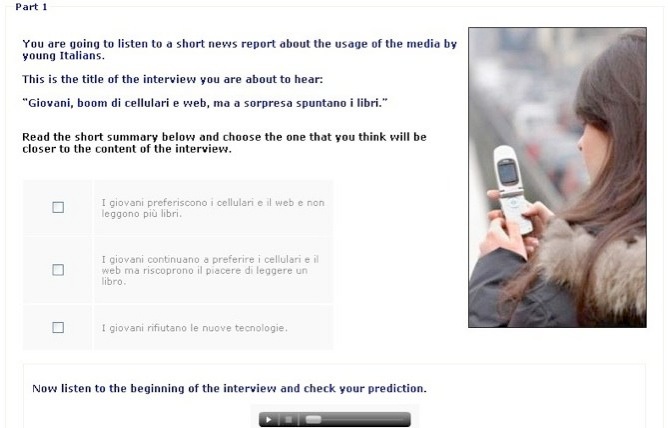
A Journey Through Online
Language Learning
Mode of Delivery > Wholly Online Learning
Wholly or fully online learning is used to refer to learning done online and at a distance with all content materials, activities, etc., provided via the internet. Fully online tutor-supported learning can be synchronous or asynchronous, or a combination. Asynchronous online learning allows communication between teachers and students, even when they cannot be online at the same time. Asynchronous online learning makes it possible for learners to study and do activities at any time. It is thus a key element of flexible learning. Synchronous online learning, often supported by videoconferencing and chat, tends to support learners in the development of learning communities. Synchronous online learning is often more social and online sessions help learners feel more like participants. Note that it is possible to combine elements from both the synchronous and asynchronous approach in fully online tutor-supported courses, as is the case in both Lagelands and Hogelands.
Wholly online materials can be used to teach students comprehensive language skills, such as is the case in Lagelands and Hogelands, or focus on one specific skill, such as Read Ukrainian or the Polish Listening and Speaking Skills. Fully online learning materials can be self-access, with some or all of the activities being self-correcting. Depending on the amount of tutor-support available, they can also include activities and assignments for which feedback is provided by the tutor.
Reading, listening and writing skills as well as grammar and vocabulary can be practised relatively easily in a wholly online context and be developed for all levels from beginners to advanced learners.
Example of a listening activity in fully-online Task Chains.
Developing fully online learning materials for speaking used to be quite problematic in the past but things have improved considerably with the arrival of freely available web conferencing and chat tools. Speaking exercises in online courses without tutor-support often take the form of a drill (example from Polish course).
A challenge for fully online language learners is that they need to be or become autonomous learners as they often have to regulate their own learning process. It is therefore important for developers to build in their learning materials tools that facilitate and structure the learner’s learning process, such as tips for learning vocabulary and grammar rules (example from Hogelands) as well as self-access feedback mechanisms. It is also important that the activities in the course come with clear and detailed instructions. Students need to be able to get on with their work; even in tutor-supported courses where instant clarification is just not always available. Also information and suggested tips for structuring time can be integrated as well as materials to help learners reflect on and monitor their performance and progress. (example from Lagelands).

Things to consider
- Are you able/willing to offer tutor-support? If you decide to develop online materials without tutor-support, you need to consider the effect of this on the type of activities and skills that you will be able to offer successfully in a wholly online environment.
- What type of materials do you want to offer? Do you want to offer a comprehensive course or materials that focus on one or more specific skills? If you decide to go for a comprehensive course or to train your students in speaking and writing, then you need to include an element of tutor-support in your course.
- How will you phrase instructions and provide feedback in your course? Whether your materials will be tutor-supported or not, all instructions, explanations and feedback need to be very clear and detailed.
- How much responsibility do you want your students to take for their learning? To help them become responsible autonomous learners it is a good idea to add materials in your course that encourage a more reflective approach to learning.
Examples
- Task chains
- Polish Listening and Speaking
- Online Reading Skills Course in Business Dutch
- Lagelands
- Hogelands
Further reading
- Van Rossum, M. (2003), ‘On-line and face-to-face language learning compared: the student experience.’ Paper presented at Setting the Agenda: Languages, Linguistics and Area Studies in Higher Education Conference, Manchester: 24-26 June 2002. http://www.lang.ltsn.ac.uk/resources/conferenceitem.aspx?resourceid=1386
Disclaimer I Freedom of Information I Accessibility I Contact Us
University College London, Gower Street, London, WC1E 6BT Tel: +44 (0) 20 7679 2000
© UCL 1999–2011
